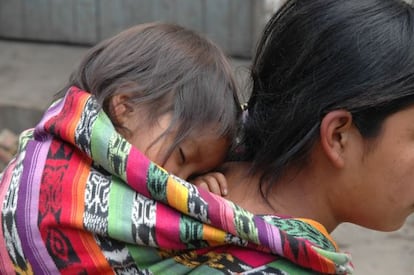UN concerned over alarming numbers of girls giving birth in Guatemala
Poverty and poor-quality education being blamed for rise in juvenile mothers

María Rosa – not her real name – is a 14-year-old girl who, instead of playing with dolls like others her age, wakes up at 4am to prepare the corn to take to the mill where she makes tortillas, an important staple in Guatemala.
She carries her 16-month-old daughter on her back; her future now depends on ensuring that she has enough to eat for her and her infant.
With resignation, María Rosa, a Mayan Indian, recalls that when she was 12 she fell for a boy who told her he was single. Their puppy love grew serious and she became pregnant without even knowing it – her sisters had to tell her she was going to have a child.
Because she was a minor, the authorities prosecuted the boy. “It was very painful to see him in court with his wife and three children,” she said.
The judge ruled that the boy had to recognize his future daughter and provide child support for María Rosa. The defendant agreed and signed the court order. A few weeks later he emigrated illegally to the United States, leaving the mother and child completely helpless.
But her plight was just beginning. Her mother died suddenly and her father ran off with another woman. Alone and abandoned, she sought her grandmother’s help and was given a small space to sleep at her home.
While they are still adolescent, a mother is not physically prepared to nurse her child."
She works 16 hours a day for a meager salary that is just enough to pay for minimal food each day: corn tortillas and some beans. Because she is a minor, she cannot register her daughter at the Civil Registry and her father and grandmother have refused to help her with this task. For all legal purposes, her baby doesn’t exist.
María’s case is not an isolated one. Since January, the regional hospital at Quetzaltenango has reported eight births from girls aged between 10 and 12. About 60 children per month go to the hospital to seek some form of birth control.
But the number of juveniles giving birth could be higher. Aura Elías, who has been a midwife for 25 years, said she delivers at least five babies per month from mothers who are 14 years old or younger – a statistic that is not officially reported.
According to Unicef figures, there were 54,971 births in Guatemala last year from mothers who were younger than the age of 19. “Of those, 3,771 belong to girls whose ages range between 10 and 14,” said Christian Skoog, Unicef coordinator in Guatemala.
The agency said that it has already registered 32 births this year among 10-year-old girls.
Guatemala, Nicaragua and Honduras are the Latin American nations with the highest birth rates among juveniles, according to UN figures. “Guatemala has the highest percentage rate, and it is among the 10 top countries in the world with the most cases,” Skoog added.
This phenomenon also influences the number of maternal deaths, of which Guatemala has one of the highest rates in the world: 139 per 100,000 births. In neighboring Costa Rica, just 30 deaths at child birth are reported each year.
Lack of educational services is the biggest reason why many girls are becoming pregnant, according to Unicef. “There is a growing pledge to improve education but it isn’t enough,” said Skoog. “In Guatemala, there is a legal framework that is very good but there are insufficient government resources to allow it to happen. While they are still adolescent, a mother is not physically prepared to nurse her child. So this is another extreme condition that comprises a child’s future from the first day it is born.”
Tu suscripción se está usando en otro dispositivo
¿Quieres añadir otro usuario a tu suscripción?
Si continúas leyendo en este dispositivo, no se podrá leer en el otro.
FlechaTu suscripción se está usando en otro dispositivo y solo puedes acceder a EL PAÍS desde un dispositivo a la vez.
Si quieres compartir tu cuenta, cambia tu suscripción a la modalidad Premium, así podrás añadir otro usuario. Cada uno accederá con su propia cuenta de email, lo que os permitirá personalizar vuestra experiencia en EL PAÍS.
¿Tienes una suscripción de empresa? Accede aquí para contratar más cuentas.
En el caso de no saber quién está usando tu cuenta, te recomendamos cambiar tu contraseña aquí.
Si decides continuar compartiendo tu cuenta, este mensaje se mostrará en tu dispositivo y en el de la otra persona que está usando tu cuenta de forma indefinida, afectando a tu experiencia de lectura. Puedes consultar aquí los términos y condiciones de la suscripción digital.








































